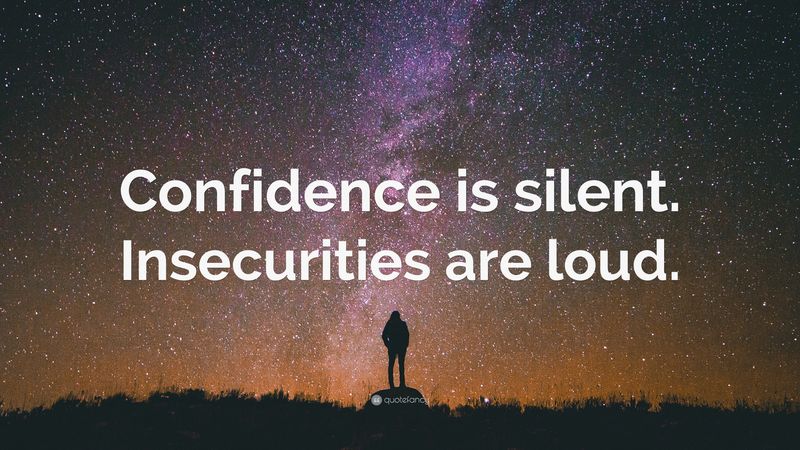Facing arrogance can be challenging, yet with the right words, it’s possible to deflate an inflated ego without causing unnecessary conflict. Here are ten carefully crafted phrases designed to put an arrogant person in their place, each accompanied by a vivid image prompt and a tailored search query.
1. ‘Confidence is silent. Insecurities are loud.’

This phrase serves as a gentle reminder that true confidence doesn’t need to announce itself loudly. Those who are secure in themselves tend to let their actions and presence speak volumes, rather than their words.
When faced with arrogance, delivering this statement can subtly expose the insecurity behind the bragging. It’s a nuanced way to encourage self-reflection without direct confrontation, offering a moment of introspection.
Ultimately, it promotes understanding that confidence is felt and seen, not heard, urging the arrogant person to reconsider their approach.
2. ‘Do you need a ladder for that pedestal?’

This phrase is a playful jab that highlights someone’s inflated sense of self-importance. By asking if they need a ladder, it implies that they’ve placed themselves on such a high pedestal that it’s almost unreachable.
The humor in the delivery softens the blow, making it an effective way to address arrogance without hostility. It suggests that maybe they’ve elevated themselves too high and a little grounding might be needed.
This phrase can provoke thought, prompting them to evaluate whether their self-image aligns with reality.
3. ‘Even the tallest trees fall in strong winds.’

Using nature as a metaphor, this phrase implies that no matter how strong or superior one may feel, everyone has vulnerabilities. Even those who seem towering and invincible can face challenges that bring them down.
It serves as a reminder of humility, encouraging the arrogant individual to recognize that strength includes knowing one’s weaknesses.
By suggesting that they are not invincible, it encourages a more balanced self-view. This reflection on nature’s power and unpredictability can be quite grounding.
4. ‘Wisdom listens, arrogance talks.’

This phrase contrasts wisdom and arrogance, emphasizing the value of listening over speaking. Arrogance often manifests through incessant talking, while wisdom is characterized by silence and listening.
Using this phrase can highlight how much more there is to gain through listening rather than boasting. It suggests depth and understanding come from observing and absorbing, not merely broadcasting one’s own voice.
Encouraging an arrogant person to pause and listen can open them up to new insights and perspectives they might otherwise miss.
5. ‘Is there room for anyone else on your soapbox?’

Soapboxes are traditionally where people stand to express their views loudly and freely. By asking if there’s room for others, this phrase points out their monopolization of conversation.
It suggests sharing the platform and considering others’ opinions, highlighting the importance of dialogue, not monologue.
This question can invite self-reflection about conversational dynamics and respect for others’ voices, promoting a more inclusive and engaged interaction.
6. ‘Not every battle is won with a sword.’

This metaphor suggests that confrontations and challenges aren’t always solved through aggressive tactics. Instead, persuasion, understanding, and diplomacy can be far more effective.
By using this phrase, you imply that not all victories involve defeating others; sometimes, winning means finding common ground.
Encouraging someone arrogant to consider alternative approaches fosters a mindset that values peace and mutual benefit over dominance.
7. ‘Sometimes the loudest in the room is the weakest.’

Loudness is often mistaken for strength, but this phrase suggests the opposite. It conveys that true power doesn’t need to be boisterous.
In a room of loud voices, the quiet confidence of one can speak volumes, challenging the belief that volume equates to authority.
This phrase can help someone realize that excessive bragging might reveal underlying insecurity, encouraging them to embrace quiet strength instead.
8. ‘A lion doesn’t need to roar to be respected.’

This phrase uses the lion, a symbol of strength and majesty, to illustrate how respect is earned, not demanded. The imagery of a lion shows that true leaders command respect through presence, not noise.
It suggests that real authority comes from actions and integrity, not just declarations.
For someone caught in arrogance, this can be a poignant reminder that quiet leadership and genuine respect are more impactful than mere bravado.
9. ‘Is your opinion the only one that matters?’

This question challenges the assumption that one’s viewpoint is superior to all others. It encourages considering the validity and importance of diverse perspectives.
By questioning their dominance in conversation, it opens the floor to inclusive dialogue, which can enrich understanding and collaboration.
Encouraging someone to value others’ opinions fosters a more balanced discourse, promoting mutual respect and empathy.
10. ‘Does your crown feel heavy?’

The crown symbolizes authority and self-importance, and this phrase questions whether such a burden is worth the strain.
It suggests that being constantly on a pedestal can be tiring, hinting at the effort required to maintain such a facade.
Encouraging reflection on the weight of their arrogance, it can prompt consideration of the benefits of humility and genuine connections over maintaining an inflated self-image.

